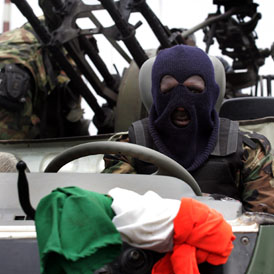Ivory Coast: UN confirms evidence of ethnic massacres
Exclusive: UN Assistant Secretary-General for Human Rights reveals UN investigators have identified a third possible massacre site in the west of Ivory Coast.

The man overseeing the UN team investigating mass killings in the Ivory Coast has confirmed to Channel 4 News that in addition to two mass graves which were found in Duekoue in March, reports based on “reliable information” have led the team to investigate a third site in Bloleuquin.
The UN Assistant Secretary-General for Human Rights Ivan Simonovic spoke to Channel 4 News from Abidjan. He had just returned from Duekoue whilst on a week long mission to oversee the investigation into reports of mass killings.
He said “in the second half of March 100 people were killed in Duekoue, and on the 28th March 230 people were killed.”
Whilst Ivan Simonovic did not specifically use the phrase “ethnic cleansing”, he told Channel 4 News: “here are the hard facts: in the first incident the 100 victims were of a single ethnicity, from the Dioula ethnicity who traditionally support Ouattara, they were found after pro-Gbagbo forces were in control. And in the second incident 230 people from the Guerra ethnicity, traditionally supporters of Gbagbo, were killed at the time when Ouattara’s forces were in control.”
On 31 March Channel 4 News first learned of unverified reports of mass killings in the 'wild west' region of Ivory Coast.
Read More: Ouattara forces deny 'mass killing' claims.
His team were “still counting bodies scattered around the town,” he added.
Mr Simonovic said: “In the first incident the victims were both men and women, and in the second incident they were mostly men who were wearing civilian clothes.”
He could not verify if children had been killed in Duekoue but confirmed there had been instances of “sexual violence,” although he could not verify to what extent this had happened.
In Abidjan, he told Channel 4 News: “We’ve heard cases of people being burnt alive, but we can’t verify how many.”
On Wednesday the Prosecutor of the International Criminal Court, Luis Moreno-Ocampo, said he plans to request authorisation from the court to initiate an investigation into reported massacres in the west of the country. In a statement he said: “The office continues to collect information on alleged crimes committed there by different parties to the conflict.”
Abidjan
Mr Simonovic told Channel 4 News that even before the last few days of unrest “400 people had been killed in Abidjan alone.”
“The chief medic of the UNOCI told me 100-200 civilians have been deliberately targeted by heavy artillery solely in Abidjan, before the recent unrest, and it was mostly committed by pro-Gbagbo forces,” he added
Mr Simonovic said he was greatly concerned about the political and security vacuum in Abidjan and that “ordinary criminal gangs and large scale looting are common there.”
We’ve heard cases of people being burnt alive. Ivan Simonovic, UN Assistant Secretary General for Human Rights
When asked if he was concerned about the risk of reprisal killings by Ouattara’s men in response to Gbagbo atrocities in Abidjan, he said “it is a major concern and the Government must do everything in its power to prevent the retaliation of its forces.”
He welcomed the creation by the UN Human Rights Council of an independent international commission of inquiry to investigate the alleged abuses and rights violations, but expressed regret that such measures weren’t established after the last civil war in 2002.
“After 2002 we never really had the truth established, and we never had accountability for war crimes, if we had done so we could maybe have avoided what has happened now.”
Asked why such measures weren’t put in place after the 2002 war, Mr Simonovic said “probably because of political compromises” but he would not go into detail.




